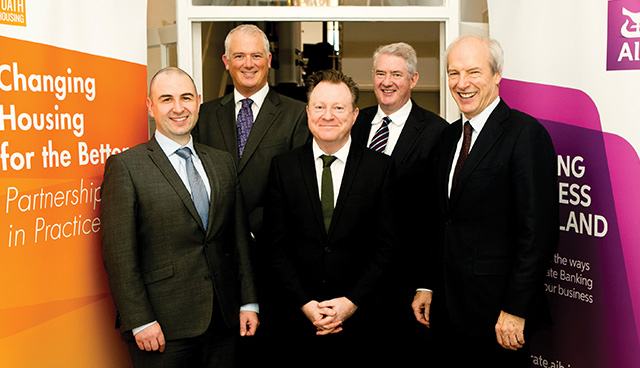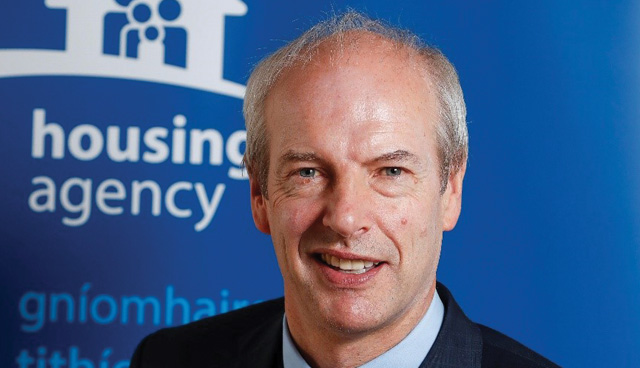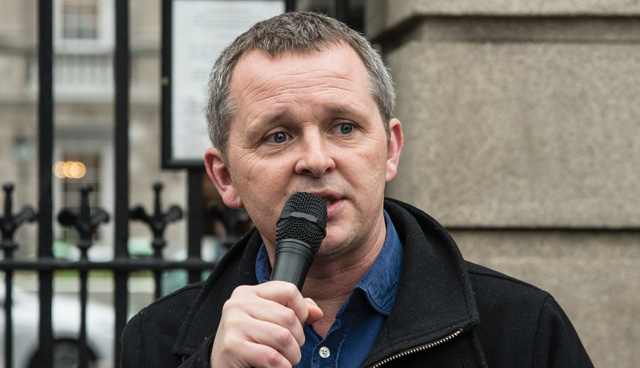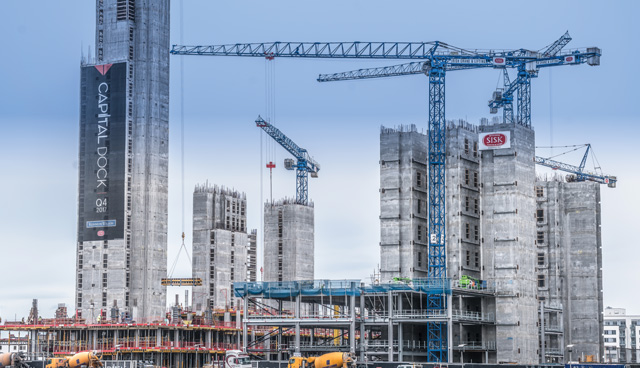
Michael Carey, Housing Agency Chairperson
1st August 2018
AIB Corporate Banking and the social housing sector
1st August 2018Rebuilding Ireland: Minister Eoghan Murphy, TD

Writing in Ireland’s Housing Magazine, Minister for Housing, Planning and Local Government Eoghan Murphy, TD provides an overview of the developments which have occurred under Rebuilding Ireland over the last two years.
As we approach the second anniversary of the launch of Rebuilding Ireland Action Plan for Housing and Homelessness, it is timely to check on its progress. I appreciate the opportunity to highlight some of the key areas where we have made progress.
Rebuilding Ireland is a €6 billion, multi-annual, broadly-based action plan which seeks to increase the overall supply of new homes to 25,000 per annum by 2020; deliver an additional 50,000 social housing units in the period to 2021; and meet the housing needs of an additional 87,000 households through the Housing Assistance Payment (HAP) scheme and the Rental Accommodation Scheme.
Since 2016, Rebuilding Ireland has already delivered over 12,700 built, bought or long-term leased homes in addition to a further 32,000 flexible housing solutions under HAP and RAS. That’s almost 45,000 individuals and families who have had their housing needs met over a two-year period.
Homelessness
Addressing homelessness is one of the main priorities for this Government and the key issue we need to address is to increase the supply of housing generally. Rebuilding Ireland includes ambitious plans to increase the stock of social housing by 50,000 by 2021.
During 2016 and 2017, over 7,700 individuals exited homeless emergency accommodation into homes. This shows that while the numbers in emergency accommodation remain high, results are being delivered.
Other measures are also being delivered such as the use of the Housing Assistance Payment to support families in private rented accommodation. In 2017, we established a Homeless HAP Placefinders service in the Dublin Region Homeless Executive, which leads the response to homelessness in the four Dublin local authorities, and in Cork. Over 2,000 families are now being supported by the scheme. Following the success of the scheme in Dublin and Cork, the scheme was introduced into all local authorities earlier this year.
Towards the end of 2017, I established an Inter-Agency Group on Homelessness to provide a more coordinated government response to homelessness. This is important both in terms of addressing the pathways to homelessness and addressing the needs of those in homeless services. Many of those in homeless services have needs beyond housing and we need to ensure we respond to those needs cohesively. An important development in this regard is the Housing First Programme. Housing First works with the most vulnerable people experiencing homelessness and provides accommodation and wrap around supports to help them sustain their tenancies. The programme in Dublin is showing great results in tenancy sustainment and further programmes are being introduced in Cork, Galway and Limerick during 2018.
There is no single initiative that will solve the housing crisis. The challenges are complex and interconnected. That is why Rebuilding Ireland has adopted a multi-faceted approach to our current housing problems…
Supply
On the supply of social housing, strong progress on implementation is already being made. On the construction front, the Construction Status Report for Q4 2017 showed a programme of works at various stages that will deliver in the region of 11,000 new homes, with the number of schemes in the programme growing on a weekly basis. Further progress will be demonstrated when we publish the Quarter 1 2018 report shortly.
Beyond social housing, all relevant indicators – including planning permissions, construction commencement notices and connections to the ESB grid – are showing very significant upward trends in home-building activity.
There is no single initiative that will solve the housing crisis. The challenges are complex and interconnected. That is why Rebuilding Ireland has adopted a multi-faceted approach to our current housing problems and sets out a framework to bring long-term equilibrium to the housing sector to avoid the stresses and diseconomies associated with a ‘boom-bust’ sector.
The greatest impact to tackling our housing problem is and will continue to be dependent on the continued engagement and proactive approach adopted by our stakeholders, such as local authorities, housing agencies, voluntary bodies and the construction sector. Stakeholders working in collaboration with the Department will bring decent homes to many households in need and will help narrow the affordable housing gap for those wishing to secure a home of their own.
We have done a lot under Rebuilding Ireland and follow-up initiatives to increase housing supply, for example, through increased capital investment in social housing, fast-track planning reforms, enabling infrastructure provision and new and streamlined guidance. The signs of recovery are very positive, with strong increases in planning permissions, construction commencement notices and residential construction investment.
Planning permissions for 24,531 new homes were granted in the 12 months to March 2018, up 37 per cent on the figures for the 12 months to end Q1 2017 (17,934). Indeed, in the first quarter of 2018 alone, planning permissions were granted for 8,400 homes, compared with 4,650 homes for Q1 2017, an increase of more than 80 per cent, substantially due to major planning decisions under the Strategic Housing Development fast-track planning process.
Commencement Notices are up by 23 per cent, with notices for 18,500 new homes nationwide submitted in the 12 months to April 2018. As an indicator of multi-unit developments, there were 9,355 housing guarantee registrations recorded nationally in the 12 months to April 2018 (up 35 per cent year-on-year).
Affordable housing
On the affordable housing side of things, I have introduced a number of measures to increase the supply of Affordable Housing. I’m adding €50 million to the €25 million, already allocated, making €75 million available to local authorities for enabling infrastructure on their lands for affordable housing delivery. Local authorities will provide €25 million making €100 million in total. This approach helped Dublin City Council deliver affordable housing in Ballymun with the Ó Cualann Housing Co-operative. The funding will be targeted to the worst affected counties in the first instance.
With well over half of all tenancies now covered by RPZs, we are making sure that all landlords comply with the 4 per cent max rent increases.
I have commenced the affordable house purchase provisions of the 2009 Housing Act. This gives legislative backing to the type of affordable housing Dublin City Council is delivering at O’Devaney Gardens. Local authorities in target counties have identified land for 4,000 affordable homes and the Department is working with them to identify the land for 10,000 affordable homes.
I’m also working on a significant cost rental project in Dublin. Cost rental is something that is very common in advanced housing systems around Europe and it is a sector we want to grow here. Between the affordable purchase and cost rental local authorities will have choice in the approaches to delivering affordable housing from their land bank. Now it is all about accelerating that delivery.
Private rented sector
The Government has prioritised a range of further actions to ensure that existing rent predictability measures, such as the Rent Pressure Zones (RPZs) and increased security of tenure, are fully respected and enforced.
With well over half of all tenancies now covered by RPZs, we are making sure that all landlords comply with the 4 per cent max rent increases and we are giving the RTB increased enforcement powers to act where these new rules are not being applied.
The Government approved the priority drafting of a Residential Tenancies Bill, the primary provisions of which relate to strengthening enforcement by:
- making it an offence for landlords to implement rent increases that contravene the law around RPZ rent limits (4 per cent per annum);
- providing powers to the Residential Tenancies Board (RTB) to investigate and prosecute landlords who implement such increases; and
- allowing the RTB to initiate an investigation without the need for a complaint to be made.
The Bill will also make it an offence for landlords to break the RPZ rules.
The RTB also published a guidance note in late November on the “substantial change” exemption in RPZ areas to make it clearer for landlords and tenants what this constitutes.
Another key policy that will help to deliver more new properties for rent, and more affordable rental properties, is the publication (March 2018) of revised apartment planning and design guidelines. These guidelines will facilitate more cost-effective and flexible design to meet different rental market segments.
The new guidelines also facilitate the development of specific build-to-rent developments as well as shared accommodation rental models, which are suited to city centre development at scale and which will help to boost the supply of urban core rental accommodation at more affordable levels. This approach is in line with the National Planning Framework principle of delivering compact city centre living as opposed to continued outward sprawl.
I hope this outline gives a good feel for the progress in two years under Rebuilding Ireland. We have made progress in many areas and will continue to drive forward with our agenda for change.






